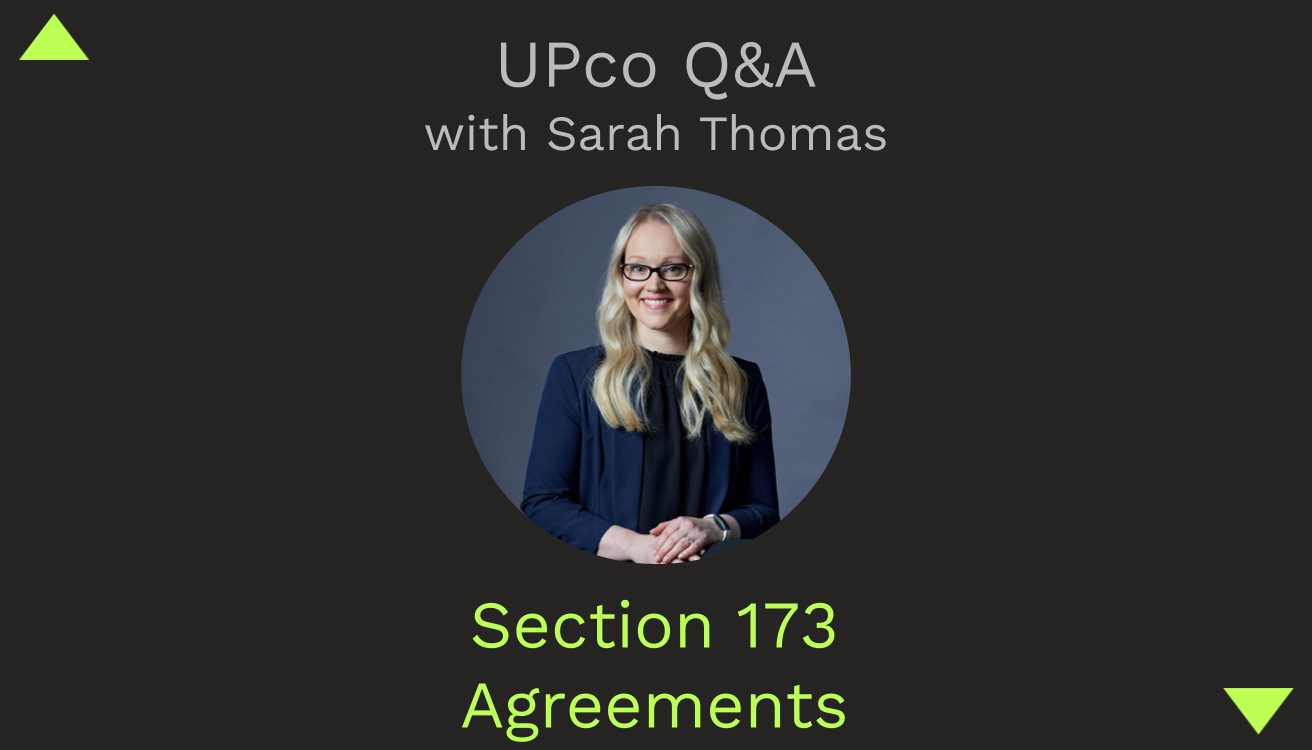
WHAT IS A SECTION 173 AGREEMENT?
When Victoria’s recent planning reforms were announced, section 173 agreements were referred to more than once. So, we thought we’d have UPco Associate Director Sarah Thomas explain what they actually are, and how they affect those looking to buy and develop land.

First thing’s first. What is a section 173 agreement?
Section 173 agreements (s173 agreements for short) can have a significant impact on how you can use or develop your land.
Essentially, it’s a legally binding agreement that is made voluntarily between a responsible authority (such as a council) and a current or prospective landowner. It places specific restrictions or conditions about how the land is used and/or developed.
For example, a s173 agreement may stipulate that certain trees on the site are protected, or that the landowner must have public liability insurance for a pedestrian path that’s within the site boundaries. S173 agreements also often relate to affordable housing obligations and environmental audit requirements – they can even include design guidelines (this is often seen in new estates).
The power to enter into these agreements is outlined in section 173(1A) of the Planning and Environment Act 1987 (otherwise known in the planning world as the Act).
How is it different to a permit condition or restrictive covenant?
A s173 agreement is recorded on the title to the land. This means that it can impose an ongoing obligation on landowners and the responsible authority, often binding future landowners in perpetuity.
S173 agreements also differ from restrictive covenants. The latter are typically negative, preventing certain things from happening, such as building anything on a certain site apart from one private dwelling. In contrast, s173 agreements can be positive (such as making a landowner commit to providing access to a shared walkway, or providing and maintaining a certain amount of affordable housing).
What are the pros and cons of a s173 agreement?
| Pros | Cons |
| They can help ensure that planning outcomes are achieved and have long-lasting impacts (although it’s important to note that they CAN expire). They also don’t contradict the Planning Scheme, so there’s no room for dodgy loopholes. | They can be expensive, carry an administrative burden and can be difficult to remove or vary. They leave the responsible authority with a great deal of power. |
Generally speaking, s173 agreements shouldn’t be imposed where a permit condition would be sufficient.
How do I know if my land is affected by a s173 agreement? … and what if it is?
S173 agreements are listed on the title to the land, so you can simply search to find out – ideally before you purchase the land or, if you already own the land, before you lodge a planning application. If you find that a s173 agreement does apply, you’ll need to obtain legal advice. This will help you understand the implications of the s173 agreement, and how you (as a landowner) may be affected.
In very rare cases, s173 agreements can be removed, amended or varied – but only by the responsible authority.[1] If you’re seeking this type of change, the first step is to request ‘in principle support’ from the responsible authority. If this isn’t granted, then there is no right to appeal.
If ‘in principle support’ is granted, here’s what needs to happen:[2]
- The landowner lodges a formal application to the responsible authority.
- All parties are notified of the proposal (including anyone the responsible authority believes will be impacted).
- The responsible authority decides the outcome and notifies all parties.
- The landowner pays the costs of notice and the preparation of any amended s173 agreement.
- If no appeals are lodged,[3] the responsible authority registers the amended with the Registrar of Titles.
What are the key take-aways when it comes to s173 agreements?
In short, these are binding legal agreements that can be difficult to change. While they can help achieve planning objectives, they can also be costly. We think there are often better pathways and s173 agreements should be a last resort.

Any questions (about this or anything else planning related)? Send them our way and we’ll do our best to answer – just email info@upco.com.au
[1] The responsible authority is given this power under section 178 of the Act.
[2] This is required under sections 178A to 178I of the Act.
[3] Appeal rights (for parties, objectors and affected persons) are provided in sections 184 to 184D of the Act.
